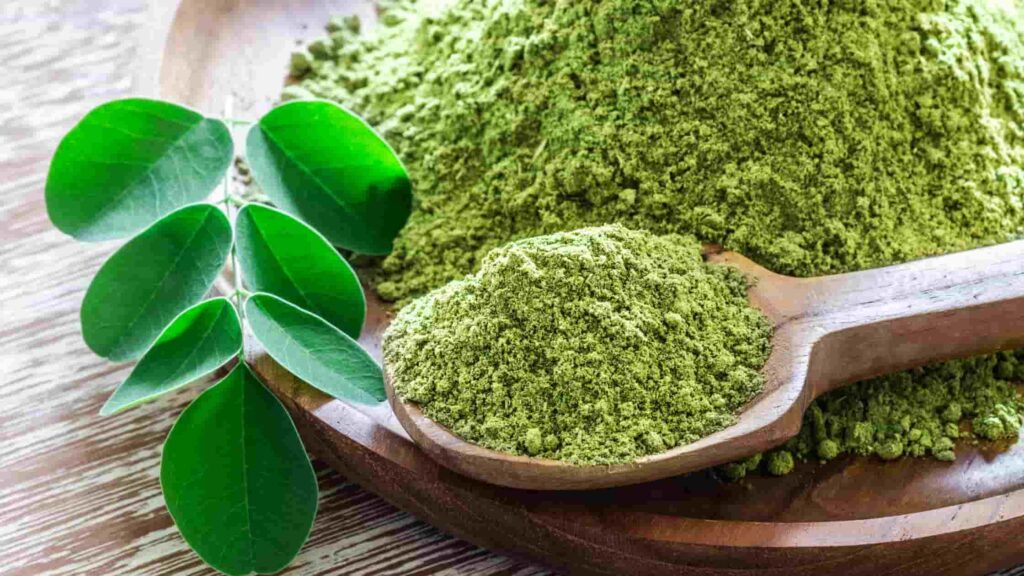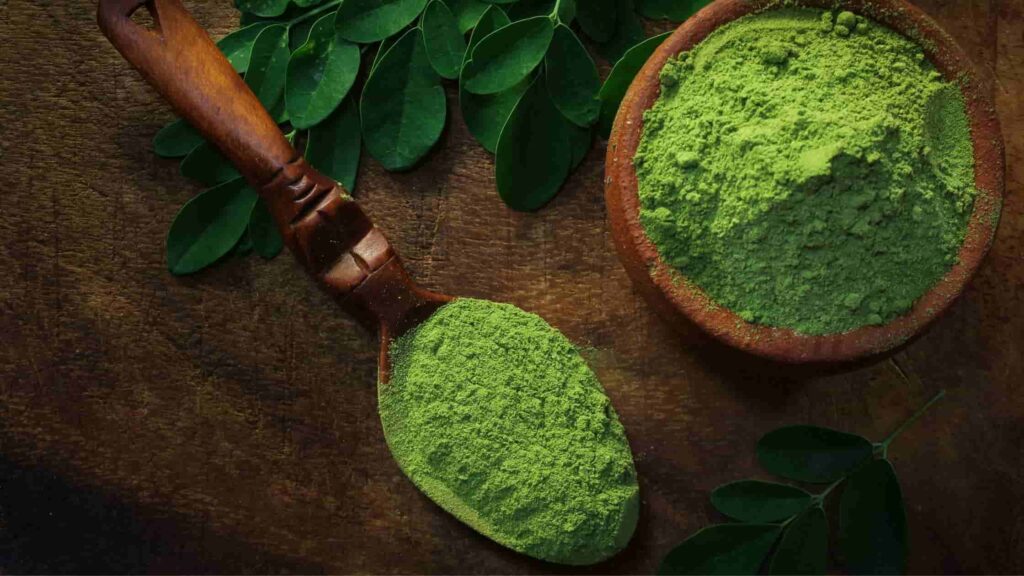When I first added moringa powder to my morning smoothies, I noticed a steady boost in energy and focus within a few days. It also helped improve my digestion and reduced my sugar cravings naturally.
Made from dried moringa leaves, moringa powder is a nutrient-dense supplement with anti-inflammatory, antioxidant, and energy-boosting qualities.
In this article we discuss about “Moringa Powder”
Table of Contents
Introduction:
The dried leaves of the Moringa oleifera tree are used to make moringa powder, which has become well-known throughout the world as a powerful natural supplement. Moringa, sometimes known as the “miracle tree,” is a rich source of vitamins, minerals, antioxidants, and bioactive substances. Moringa is utilized in both conventional and contemporary wellness regimens for a variety of purposes, including blood sugar regulation and immunity assistance.
In this comprehensive guide, we explore what moringa powder is, its science-backed health benefits, possible side effects, usage tips, and answers to common questions.
What Is Moringa Powder?
The nutrient-rich leaves of the Moringa oleifera tree are harvested, dried, and ground to create moringa powder. The tree, which is native to South Asia and is now planted all over the world, goes by a number of names:

- Because of the shape of its seed pods, the drumstick tree
- Ben oil tree (its seeds produce ben oil)
- Horseradish tree (because of its sharp root taste)
The leaves are the most nutritious part and are often consumed in powdered form for convenience and longer shelf life.
Nutritional Profile of Moringa Powder:
One of the biggest reasons for moringa’s popularity is its dense nutritional content.
Key Vitamins and Minerals in Moringa Powder:
- Vitamin A: Important for eye health and immunity
- Vitamin C: Promotes healthy skin and the immune system
- Vitamin E: A powerful antioxidant
- Vitamin B1: (Thiamine), B2 (Riboflavin), B3 (Niacin): Crucial for energy metabolism
- Calcium: Promotes strong bones and teeth
- Iron: Supports red blood cell production
- Magnesium and Potassium: Vital for heart and nerve function
- Phosphorus: Essential for healthy bones and energy storage
Moringa powder is also low in fat, contains no harmful cholesterol, and has high antioxidant levels, including quercetin, chlorogenic acid, and beta-carotene.
Top 14 Health Benefits of Moringa Powder:
1. Nourishes Skin and Hair Naturally:
Moringa’s rich antioxidant content helps combat oxidative stress, which can lead to premature aging and skin damage. Moringa seed oil is often used in skin and hair products to:
- Reduce inflammation and redness
- Promote faster wound healing
- Add shine and moisture to hair
- Strengthen hair follicles
2. Reduces Inflammation and Treats Edema
Edema is the swelling caused by fluid retention. Studies show that moringa extract has strong anti-inflammatory properties, which may reduce swelling from infections, injuries, or chronic inflammation.
3. Detoxifies and Protects the Liver
Moringa may aid in detoxification and support liver health, especially in people at risk for non-alcoholic fatty liver disease (NAFLD). It works by reducing liver fat buildup and enhancing enzyme activity that helps break down fats.
4. May Help Prevent Cancer
Moringa contains niazimicin, a compound shown to inhibit cancer cell growth in laboratory settings. Early research indicates moringa extracts may suppress tumor growth and promote apoptosis (cell death) in:
- Breast cancer
- Liver cancer
- Colorectal cancer

More clinical trials on humans are needed.
5. Improves Digestive Health
Because moringa leaves have a modest laxative action, they can help patients who are constipated. It might also:
- Reduce gastric acid secretion
- Help heal peptic and colon ulcers
- Reduce inflammation in the gut
- Offer protective benefits for those with ulcerative colitis
6. Fights Harmful Bacteria
Lab studies have shown that moringa contains antibacterial agents that combat foodborne pathogens like:
- Staphylococcus aureus
- Escherichia coli (E. coli)
This suggests it may help reduce the risk of diarrhea, food poisoning, and other digestive infections.
7. May Help Treat Rheumatoid Arthritis
Its anti-inflammatory effects may reduce joint pain, stiffness, and inflammation in conditions like rheumatoid arthritis and osteoarthritis, although more clinical data is needed.
8. Supports Brain Function and Mental Well-Being
Moringa’s antioxidant properties may help protect the nervous system. It may reduce oxidative stress linked to depression, Alzheimer’s disease, and multiple sclerosis (MS).
Some research also suggests that moringa enhances memory, focus, and mood by influencing neurotransmitter levels.
9. Improves Cardiovascular Health
Moringa contains compounds like quercetin and chlorogenic acid that:
- Lower bad (LDL) cholesterol
- Reduce triglycerides
- Lower blood pressure
- Protect against oxidative heart damage
10. Balances Blood Sugar Levels
Some studies have shown that moringa powder can help:
- Lower fasting blood sugar levels
- Improve insulin sensitivity
- Prevent sugar spikes after meals
11. Eases Asthma and Improves Lung Function
Animal studies show moringa extract can reduce airway inflammation and improve breathing. It may be helpful for asthma sufferers, though more human trials are required.
12. Regulates Blood Pressure
In one small human study, participants who ate cooked moringa leaves experienced a temporary drop in blood pressure. The high potassium and antioxidant levels in moringa may help improve circulation and reduce hypertension risk.
13. Promotes Eye Health
Moringa contains beta-carotene, which helps protect eyes from oxidative damage and age-related macular degeneration. It may also help improve night vision.
14. May Help With Anemia and Sickle Cell Disease
Moringa may help stimulate red blood cell production and iron absorption. It also shows promise in managing symptoms of sickle cell disease, thanks to its anti-inflammatory and antioxidant actions.
Can Moringa Powder Help With Weight Loss?
Moringa may support weight management by:
- Reducing fat formation
- Improving insulin sensitivity
- Lowering cholesterol
- Decreasing oxidative stress
- Enhancing liver function
- Regulating fat digestion and absorption
How to Use Moringa Powder:
You can use moringa powder in many creative and healthy ways.
1. Daily Dosage:
- General health: 1–2 teaspoons (2–4 grams) per day
- Therapeutic use: Up to 6 grams/day, as advised by a doctor
2. Popular Uses:
- Add to smoothies or protein shakes
- Mix into yogurt or oatmeal
- Stir into soups, stews, or sauces
- Brew into herbal tea
- Blend into baked goods (pancakes, muffins)
3. Best Ways to Add Moringa to Your Diet:
Because of its many uses, moringa powder is simple to incorporate into your regular diet. For a rapid nutritional boost, add it to herbal teas, smoothies, or juices. For a green superfood boost, mix it into yogurt and energy balls or sprinkle it over salads, soups, or cereal. If baking is more your style, you may incorporate moringa into homemade pancakes or muffins. Just keep in mind that it has an earthy flavor, so start with little and increase as your palate adjusts.
Side Effects and Precautions:
While most people can safely use moringa, other groups should exercise caution.
Possible Side Effects:
- Mild nausea or diarrhea (especially in high doses)
- Uterine contractions (avoid during pregnancy)
- Potential interactions with medications

Who Should Avoid Moringa?
- Pregnant or breastfeeding women
- People taking thyroid, diabetes, or blood pressure medications
- Individuals with known allergies to moringa
Always consult a doctor before beginning any new supplement.
Frequently Asked Question:
1. Who should not take moringa?
People who are pregnant, breastfeeding, or taking thyroid, blood pressure, or diabetes medications should avoid moringa without consulting a doctor.
2. How long does it take for moringa to start working?
Moringa’s effects can be noticed in a few days to weeks, depending on your health condition and dosage consistency.
3. What does moringa do for hair?
Moringa supports hair growth by providing essential nutrients like zinc, iron, and vitamin A and improving scalp health.
4. Should I take moringa in the morning or at night?
Morning is ideal for taking moringa to boost energy, digestion, and nutrient absorption throughout the day.
5. Is too much moringa powder bad for you?
Yes, high doses may cause nausea, diarrhea, or liver stress, so always follow recommended amounts.
6. Who cannot drink moringa powder?
Pregnant women, people with low blood pressure, or those on medication for thyroid or diabetes should avoid it unless approved by a doctor.
7. Is Ashwagandha better than moringa?
Ashwagandha is better for stress and hormones, while moringa excels in nutrition and anti-inflammatory benefits—both have unique advantages.
8. What does moringa taste like?
Like matcha or spinach, moringa powder has an earthy, slightly bitter, and grassy flavor.
9. What does moringa do to a woman’s body?
Moringa may support hormonal balance, improve skin, enhance fertility, and provide iron to fight fatigue and anemia.
10. Which brand of moringa powder is best?
Look for organic, non-GMO, third-party tested brands like Kuli Kuli, Organic India, or Terrasoul for quality assurance.
11. How to prepare flat tummy tea with moringa for weight loss?
Boil water, add 1 tsp moringa powder, a pinch of ginger, and lemon juice; steep for 5–7 minutes and drink daily before meals.
Conclusion:
Moringa powder is a nutrient-dense, multipurpose superfood with numerous scientifically proven health benefits, ranging from regulating blood sugar, inflammation, and digestion to boosting immunity, skin, and hair. Although most individuals find it safe, it’s crucial to take it sparingly and to speak with a doctor if you’re pregnant or taking medication. Adding moringa powder to your daily routine can be a great natural way to promote weight loss, increase energy, or enhance overall wellness.
